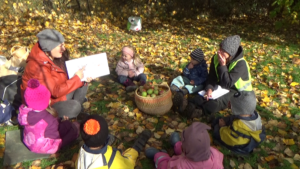About
The need for our project: International assessment studies continue to show that children of ethnic minority background and low socioeconomic status are more likely to have poor literacy skills and weak academic achievements. Preliteracy skills are strong predictors of literacy development, and, therefore, it is essential that parents and early childhood educators engage children in literacy activities from an early age. In trilingual Luxembourg, a multilingual education programme was implemented in the non-formal sector of early childhood in 2017, requiring educators to familiarise children with Luxembourgish and French and value their home languages, for instance though collaborating with parents. Aims and methodology: Our mixed-method project COMPARE examined, firstly, the ways in which educators, parents and children engaged in literacy activities and adults established home-centre collaboration and, secondly, the influence of the literacy and collaborative practices on attitudes and engagement. Data were collected through educator and parent surveys, group interviews with educational actors and librarians, interviews with educators and parents, observation of collaborative and literacy activities in three centres over one academic year, and the collection of documents of educators and parents. Findings: The analysis of the questionnaires, interviews and observations show that children were offered a range of literacy activities in multiple languages in ECEC and at home, although the practices varied greatly across homes and centres. The differences reflect the professionals’ and parents’ understanding of multilingualism and literacy as well as the educators’ pedagogies and their socio-cultural contexts. The observations show that children engaged most in translingual activities based on social constructivism. In general, 65% of educators reported reading to children daily. The regression analysis indicates that the most significant predictors of dialogic reading in ECEC and at home were children’s reading behaviour (ECEC, home), work experience (ECEC), the belief that reading in the institutional language influences the development of the home and institutional languages (ECEC), and the number of books (home). Findings relating to collaboration show a similar mixed picture with some educators never inviting parents to their centre to engage in joint activities and some doing so regularly. The observed joint literacy activities varied greatly and reflected the educators’ pedagogy and understanding of collaboration. Multiple linear regression of the educator and parent data indicate that significant positive predictors with regards to goal-oriented communication are, on the one, the educators’ professional attitudes and joint literacy activities, and, on the other hand, the parents’ satisfaction. Our contribution: Nationally, our study is the first one to provide insights into the range of literacy and collaborative practices in day care centres following the implementation of the 2017 education policy. To help educators in Luxembourg develop their understanding of the importance of literacy and collaboration, design multiliteracy activities, and establish partnerships, we offered two professional development trainings, developed videos and a guideline on dialogic reading, and organized conferences as well as many outreach activities for educators and parents. Internationally, our project contributes to the field by presenting different factors that influence dialogic reading at home and in day care centres and predict good communication between parents and educators.
Organisation and Partners
- Department of Humanities
- Faculty of Humanities, Education and Social Sciences (FHSE)
- Research Institute of Multilingualism
Project Team
- Claudine Kirsch (PI)
- Gabrijela Aleksić
- Sascha Neumann (January-March 2020)
- Valérie Kemp
- Laura Colucci
- Džoen Bebić-Crestany
